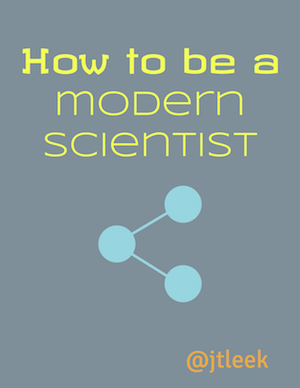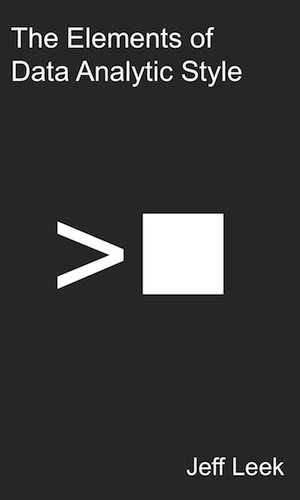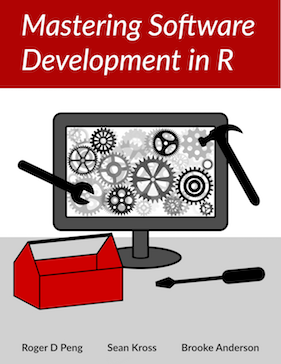Books
We have written a number of books supporting the material in our courses. We offer the books on a pay-what-you-want basis to ensure that they are affordable for all the students who take our classes regardless of their ability to pay.
How to be a modern scientist
The face of academia is changing. It is no longer sufficient to just publish or perish. We are now in an era where Twitter, Github, Figshare, and Alt Metrics are regular parts of the scientific workflow. Here I give high level advice about which tools to use, how to use them, and what to look out for. This book is appropriate for scientists at all levels who want to stay on top of the current technological developments affecting modern scientific careers. The book is based in part on the author’s popular guides including guides for
The book is probably most suited to graduate students and postdocs in the sciences, but may be of interest to others who want to adapt their scientific process to use modern tools.
The book has a suggested price of $10 but no minimum price and purchase includes access to all updates to the book if you buy it on Leanpub.
The elements of data analytic style
Data analysis is at least as much art as it is science. This book is focused on the details of data analysis that sometimes fall through the cracks in traditional statistics classes and textbooks. It is based in part on the authors blog posts, lecture materials, and tutorials such as:
- 10 things statistics taught us about big data analysis
- The Leek Group Guide to R packages
- How to share data with a statistician
The author is one of the co-developers of the Johns Hopkins Specialization in Data Science the largest data science program in the world that has enrolled more than 1.76 million people. The book is useful as a companion to introductory courses in data science or data analysis. It is also a useful reference tool for people tasked with reading and critiquing data analyses.
The book has a suggested price of $10 but no minimum price and purchase includes access to all updates to the book if you buy it on Leanpub.
Mastering Software Development in R
This book covers R software development for building data science tools. This book provides rigorous training in the R language and covers modern software development practices for building tools that are highly reusable, modular, and suitable for use in a team-based environment or a community of developers.
The world of R has evolved substantially since its early days as a statistical computing language. As the field of data science has rocketed to the forefront of all areas of scientific and industry work, R has become the centerpiece language for doing data science. Through the contributions of a vibrant and highly active developer community, R has evolved to the point where it can be considered a software development language for developing robust, modular, and highly reusable software tools.
We begin by providing a rigorous introduction to the R language, and quickly move on to more advanced aspects like functional programming, object-oriented programming, building R packages, and software maintainence. We also discuss the development of custom visualization tools through packages like ggplot2 and ggmap.
This book is about using R to develop the tools for doing data science. Whether you are on a data science team or working by yourself as part of a community of developers or data scientists, you will find this book useful as a reference for the software development process in R. Throughout, we focus on the aspects of the R language that are relevant to developing code and tools that will be used by others.
R programming for Data Science
This book brings the fundamentals of R programming to you, using the same material developed as part of the industry-leading Johns Hopkins Data Science Specialization. The skills taught in this book will lay the foundation for you to begin your journey learning data science.
Statistical inference for data science
The ideal reader for this book will be quantitatively literate and has a basic understanding of statistical concepts and R programming. The book gives a rigorous treatment of the elementary concepts in statistical inference from a classical frequentist perspective. After reading this book and performing the exercises, the student will understand the basics of hypothesis testing, confidence intervals and probability.
- Statistical inference for data science on Leanpub
Executive data science
In this concise book you will learn what you need to know to begin assembling and leading a data science enterprise, even if you have never worked in data science before. You’ll get a crash course in data science so that you’ll be conversant in the field and understand your role as a leader. You’ll also learn how to recruit, assemble, evaluate, and develop a team with complementary skill sets and roles. You’ll learn the structure of the data science pipeline, the goals of each stage, and how to keep your team on target throughout. Finally, you’ll learn some down-to-earth practical skills that will help you overcome the common challenges that frequently derail data science projects.





